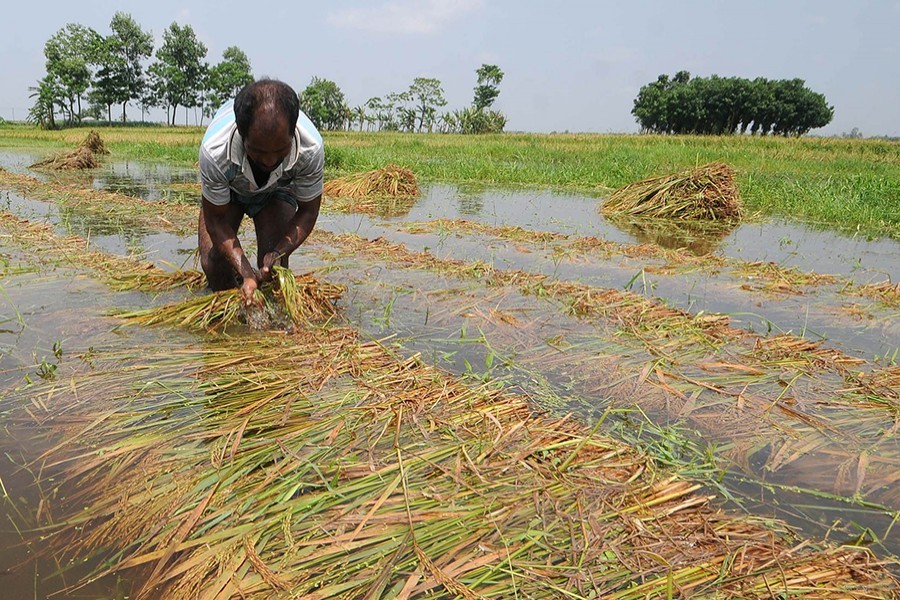Floods and downpour in tandem with drought during the June-July period have adversely impacted the farming of Aman and Aus crops this year. The unprecedented floods have damaged Aman farming in 11 districts including those of Sylhet division, some areas of Rangpur division and Mymensingh, reports the Department of Agriculture (DAE). As a result, 50 per cent of the lands for Aman farming have been badly affected. Again, the Aman farmers last fiscal were happy to have produced 14.77 million tonnes of rice --- a bumper harvest. But now, as an anticlimax, a drought situation is prevailing in this peak time for Aman seedling as well as Aus crops across the country with 30 to 48 per cent less rainfall, according to the MET office. It is indeed a strange combination of floods and drought attributed to climate change by meteorologists that has put an unprecedented challenge to the country's food security.
With the rain thus getting sparse (the country this month experienced 68 per cent less rainfall than normal) in this peak monsoon time (June to August), preparation of the seedbeds for Aman seedlings and their transplantation which is totally dependent on rainwater, have become highly problematic. Meanwhile, irrigation costs of diesel-run pumps have also shot up due to higher price of diesel, putting further pressure on Aman farmers. In some districts, on the other hand, prolonged loadshedding has dimmed the hopes of the farmers who run their irrigation pumps using electricity from the supply line. Consider that the same farmers who were happy last year are now bracing for difficult times ahead. This is really bad news for the country's monsoon (Kharif) crops including rice and vegetables that account for 45 per cent of rice and 40 per cent of the vegetables grown in the country. Now, if the drought situation continues till September, some farmers in the south-western districts fear that crop production would drop further by 10 to 20 per cent.
All these factors militate against the country's food security as the Aman crop itself meets 38 per cent of the nation's demand for rice. Apart from the anthropogenic reasons behind climate change and the erratic monsoon rainfalls as a fallout from it, direct intervention in the flow of water by way of building dams in the upstream of our major rivers has inflicted huge damage to the delicate ecosystem of the deltaic plain and the river system that it cradles, say experts. The reduced water flow in the downstream region during the lean seasons has led to intrusion of salinity which has already affected the flora and fauna including crop patterns in the coastal regions of the country. Worse yet, by opening the gates of the dams and various other water control structures in the upstream regions beyond the border at the wrong time, especially, during the rainy season, flash floods are caused every year in Bangladesh.
The recently occurring devastating Sylhet floods, which according to the local people were the century's worst, provide an example of this kind. Both the climate change-related unpredictability of monsoon rains and the human intervention in the flow of rivers are clearly the core problems negatively impacting the country's crop production and, as a corollary, food security. The government, therefore, needs to prioritise these issues in its strategy to ensure the nation's food security.


